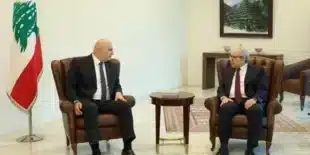French President Emmanuel Macron is set to engage in discussions with key political figures as he seeks to form a new government following last month’s unexpected legislative elections, which left no party with a majority in the National Assembly, France’s influential lower house of parliament.
According to a statement from Macron’s office, the meetings with leaders of France’s major political parties are scheduled for Friday and Monday at the Elysee presidential palace. The goal is to work towards achieving “the broadest and most stable majority possible.”
The statement also indicated that the appointment of a prime minister will be determined after these consultations and their outcomes are considered.
In the recent legislative elections, the leftist coalition known as the New Popular Front secured about one-third of the seats in the National Assembly, more than any other group. Macron’s centrist alliance finished second, while the far-right National Rally came in third.
The resulting situation, where no single political bloc holds dominance, raises the possibility of a hung parliament and political gridlock, a scenario that is unprecedented in the history of France’s modern Republic.
The New Popular Front has argued that, as the largest group, their candidate should be appointed prime minister. They have put forward Lucie Castets, a relatively unknown civil servant, as their choice for the role.
Castets will be part of Friday’s discussions, joined by prominent members of the New Popular Front, which includes the hard-left France Unbowed, the Socialists, and the Greens.
Macron is also scheduled to meet with centrist and conservative leaders on Friday, while National Rally representatives are expected to visit the Elysee on Monday.
In a televised interview last month, Macron appeared to downplay the suggestion of Castets for prime minister, emphasizing that “the issue is not a name provided by a political group” but rather the need for a candidate who can secure a parliamentary majority.
Macron’s office stated that his decision on the new prime minister would focus on ensuring stability and forming a government that is unlikely to be toppled by a no-confidence vote in parliament.
Political figures from the center, right, and far-right have indicated they might attempt to bring down any government that includes members of the France Unbowed party.
Several other names have been mentioned in the French media as potential prime minister candidates, as Macron appears inclined to form a coalition that spans from the center-left to the traditional right.
These candidates include center-left politician Bernard Cazeneuve, who was France’s interior minister during the 2015 terror attacks, and Xavier Bertrand, a former minister with moderate views within the French right. Conservative politician Michel Barnier, known for his role as the EU’s chief negotiator in post-Brexit talks, is also considered a potential contender.
There is no specific deadline for Macron to appoint a new prime minister. As per the French Constitution, the decision rests solely with the president.
Last month, Macron announced that the outgoing centrist government would continue in a caretaker capacity to manage ongoing affairs, especially during the Olympic Games, which concluded on August 11.


